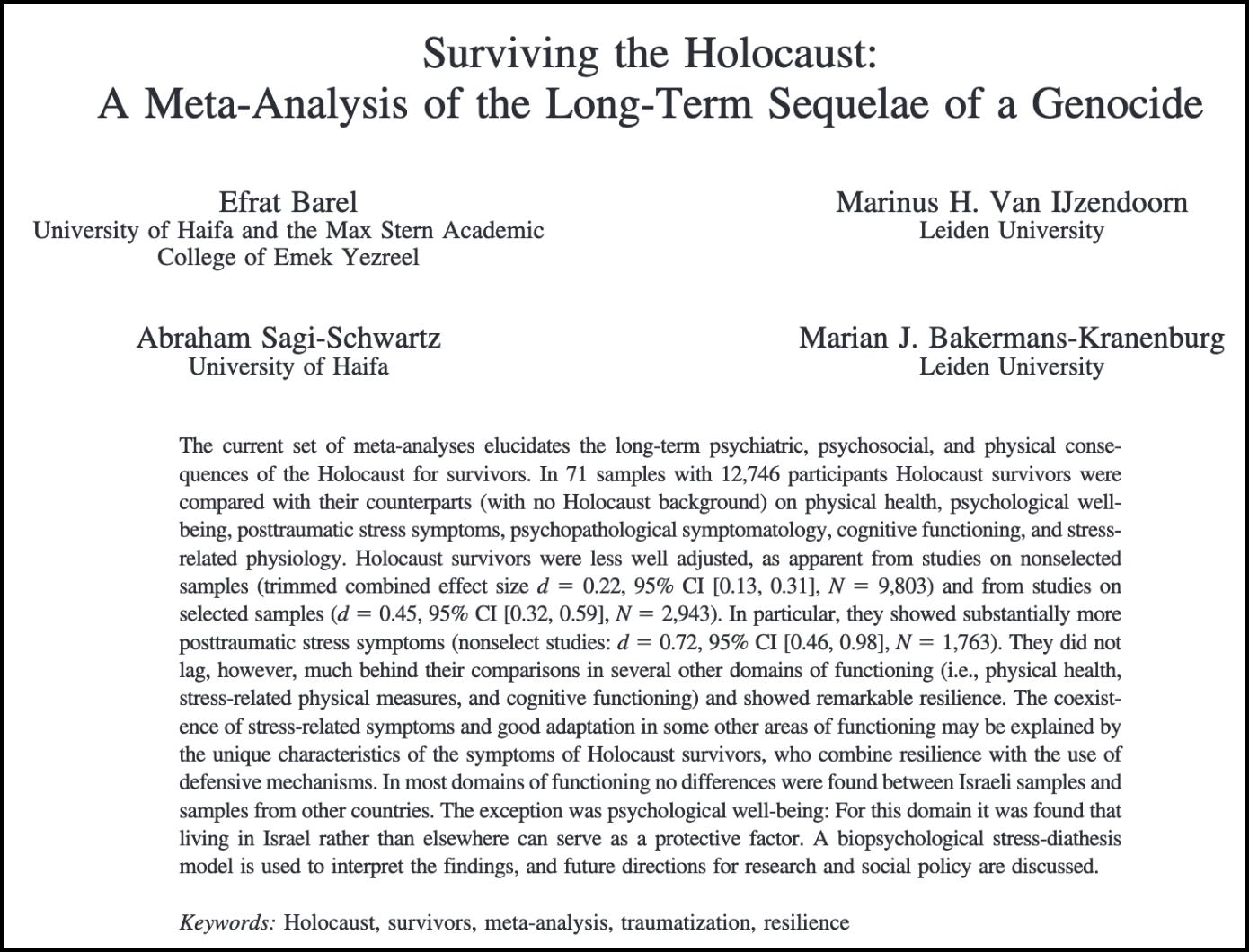In theme with Hitler’s birthday today (4/20), I thought I’d share this meta-analysis [1]:
The paper compares holocaust survivors to comparable non-holocausted jews, and found the holocaust survivors to not perform any worse in cognitive functioning (often literally IQ), physical health, or stress-related physical measures, but to perform worse in mental health.
Here are the measures of “cognitive functioning” that they used:
"Cognitive functioning included several intelligence and memory measures, such as the Mini-Mental State Examination (Folstein, Folstein, & McHugh, 1975; e.g., in Conn, Clarke, & Van Reekum, 2000), Wechsler Adult Intelligence Scale—Revised (Wechsler, 1981; e.g., in Yehuda et al., 2005), and Guild Memory Test (Gilbert, Levee, & Catalano, 1968; e.g., in Golier et al., 2005)"
The two non-IQ tests seem to exist for the sake of evaluating things like dementia or alzheimers in elderly people.
Finally, here’s the relevant table for cognitive functioning; d=0.10, and the confidence interval for the total effect includes zero:
So basically, either IQ is so non-malleable that holocaust-tier environmental effects can't appreciably affect it in the long term, or the holocaust wasn't bad enough to reasonably be expected to appreciably affect it, or both: Pick your poison.
Given the effect on mental health, probably the first option. Then again, there *was* significant publication bias.
Sauce:
Barel, E., Van IJzendoorn, M. H., Sagi-Schwartz, A., & Bakermans-Kranenburg, M. J. (2010). Surviving the Holocaust: a meta-analysis of the long-term sequelae of a genocide. Psychological bulletin, 136(5), 677. Retrieved from https://www.apa.org/pubs/journals/features/bul1365677.pdf
MMSE:
Unsorted stuff on the mini-mental state exam to look into:
MMSE Comprehensive Review:
https://sci-hub.ru/https://doi.org/10.1111/j.1532-5415.1992.tb01992.x
Review of MMSE correlations w/ various tests:
https://sci-hub.ru/https://doi.org/10.1037/a0023401
Healthy elderly sample: ~.35 with IQ, also reviews some older literature:
https://sci-hub.ru/https://doi.org/10.1002/1097-4679(199107)47:4%3C537::AID-JCLP2270470411%3E3.0.CO;2-9
The original paper from the test developers: n=246, often clinical elderly patients; r.776 w/VIQ, r.66 w/PIQ:
https://sci-hub.ru/https://doi.org/10.1016/0022-3956(75)90026-6
Cohort study of 1024 70 year olds: childhood IQ accounts for correlation between MMSE & reading tests:
https://sci-hub.ru/https://doi.org/10.1017/S0033291716001045
early-Alzheimer's patients: r=0.83 with IQ:
https://sci-hub.ru/https://doi.org/10.1111/j.1532-5415.1988.tb04020.x
150 over-75's recruited from health checks: .87 correlation between MMSE & CAMCOG test battery:
https://sci-hub.ru/https://doi.org/10.1017/S0033291700034826
Age-specific norms for the test; strong ceiling effects:
https://sci-hub.ru/https://doi.org/10.1212/WNL.38.10.1565
n=186, 60+yrs veterans; .51 with FSIQ:
https://sci-hub.se/10.1097/WNN.0000000000000035
90 male psychiatric patients of diverse ages: spreaman correlation of .41 with VIQ & PIQ:
https://sci-hub.se/https://doi.org/10.1111/j.1600-0447.1990.tb06464.x
n=208, mixed sample, r=.29:
https://sci-hub.ru/https://doi.org/10.1177/0891988713484194
VIQ in children; clinical sample: .55 ; non-clinical sample: .46 :
https://sci-hub.ru/https://doi.org/10.1177/088307389701200708
Guild Test
Scores on the Guild test correlated ~.7 with the wechler’s memory scales revised edition:
https://www.proquest.com/openview/780d55e6413e22661bb232b8c1d20084/1?pq-origsite=gscholar&cbl=18750&diss=y






